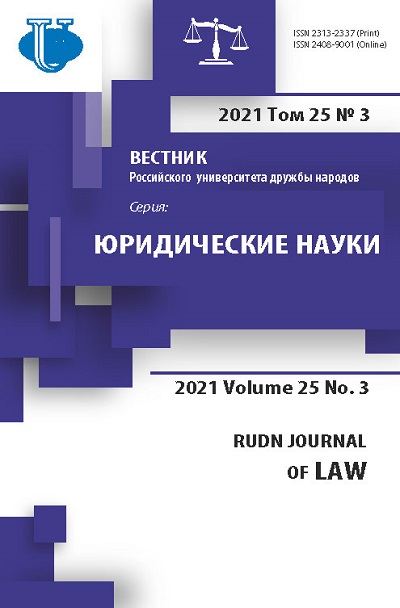Отклоняющееся государство: учение Аристотеля и постсоветская реальность
- Авторы: Власенко Н.А.1
-
Учреждения:
- Российский университет дружбы народов
- Выпуск: Том 25, № 3 (2021)
- Страницы: 479-505
- Раздел: ГОСУДАРСТВО И ПРАВО В СОВРЕМЕННОМ МИРЕ
- URL: https://journals.rudn.ru/law/article/view/27214
- DOI: https://doi.org/10.22363/2313-2337-2021-25-3-479-505
- ID: 27214
Цитировать
Полный текст
Аннотация
Анализируются содержательные стороны современной постсоветской государственности на основе традиционного методологического ориентира, получившего название элементный подход (Аристотель, Еллинек), предполагающем выделение ключевых государствообразующих признаков. Активно используется аристотельское понятие «отклоненное государство». С целью более глубокой иллюстрации так называемых «отклоняющихся» моментов в постсоветских государствах применяются метафорические сравнения - такие как «имитационное государство», «отчужденное государство», «селективное государство» и др. В числе отклоняющихся закономерностей признаются слабое системное стратегическое планирование и отсутствие соответствующих научных концепций, в том числе в чрезвычайных ситуациях, а также недостаточный суверенитет судебной власти, превалирование унитарных тенденций и др. Аргументация автора подкреплена данными, опубликованными в различных официальных источниках (статистика, результаты специальных социологических исследований, действующее российское законодательство, репортажи, мнения экспертов и т. д.). Статья рассчитана на специалистов в сфере теории государства и права, политологии, социологии и др. Будет интересна аспирантам, государственным и муниципальным служащим.
Ключевые слова
Об авторах
Николай Александрович Власенко
Российский университет дружбы народов
Автор, ответственный за переписку.
Email: vlasenko-na@rudn.ru
ORCID iD: 0000-0002-9548-3396
доктор юридических наук, Заслуженный юрист Российской Федерации, профессор кафедры теории права и государства, Юридический институт
Российская Федерация, 117198, г. Москва, ул. Миклухо-Маклая, д. 6Список литературы
- Алексеев С.С. Заметки по философским проблемам // Собрание сочинений. Т. 9: Публицистика. М.: Статут, 2010. 504 с
- Аристотель. Политика // Собр. соч. в 4 т. Т. 4. М.: Мысль, 1984. 444 c
- Бакунин М.А. Коррупция. О Макиавелли. Развитие государственности // Вопросы философии. 1990. № 12. С. 53-66
- Баранов В.М., Власенко Н.А. Метафоры в праве: методологическая опасность и перспектива. Юридическая наука и практика // Вестник Нижегородской академии МВД России. 2019. № 1. С. 11-25
- Чанышев А.Н. Аристотель. М.: Мысль, 1987. 221 с.
- Дахов И.Г. Основы противодействия коррупции. М.: НИИ СП, 2012. 114 с.
- Денисов С.А. Имитация конституционного строя: в 4 кн. Екатеринбург: Гуманитарный университет. 2018. 281 с.
- Долфсма В. Провалы государства. Общество. Рынки и правила / пер. с англ. Ю. Каптуревского; под науч. ред. Д. Кадочникова. М.: Изд-во Института Гайдара, 2017. 256 с.
- Еллинек Г. Общее учение о государстве. СПб.: Юридический центр Пресс, 2004. 752 c.
- Гулиев В.Е. Протодемократическая государственность: аксиологическая феноменология отчуждения // Право и политика. 2001. № 5. С. 4-13.
- Карпенко А.С. Аристотель и Лукасевич о законе противоречия: contra et pro // Вопросы философии. 2012. № 8. С. 154-165.
- Коррупция: природа, проявления, противодействие: монография / отв. ред. Т.Я. Хабриева. М.: Юриспруденция, 2012. 688 с.
- Хабриева Т.Я., Клишас А.А. Тематический комментарий к Закону Российской Федерации о поправке к Конституции Российской Федерации от 14 марта 2020 г. № 1-ФКЗ «О совершенствовании регулирования отдельных вопросов организации и функционирования публичной власти». М.: Норма: ИНФРА-М, 2020. 240 с
- Венецианская комиссия о выборах и избирательных технологиях / Т.Я. Хабриева, А.И. Ковлер, Е.А. Фокин и др.; под ред. Т.Я. Хабриевой. М.: Институт законодательства и сравнительного правоведения при Правительстве Российской Федерации, 2020. 400 с
- Стратегическая безопасность Российского государства: политико-правовое исследование / Селиванов А.И., Хабибулин А.Г. М.: Формула права, 2008. 360 c.
- История государственно-правовых учений: учебник / Баскин Ю.Я., Корнев А.В., Лазарев В.В., Липень С.В. и др.; отв. ред.: В.В. Лазарев. М.: Спарк, 2006. 672 c.
- Ленин В.И. Государство и революция // Собр. соч. 1949. Т. 25. М.: Изд. Полит. Лит. 675 с.
- Марченко М.Н. Советское и постсоветское государство и право: сравнительно-правовое исследование. М.: Проспект, 2017. 365 с.
- Обичкин Г.Д. Сокровищница марксистко-ленинских идей о государстве. М.: Мысль, 1980. 164 с.
- Антикоррупционное правовое воспитание: научно-практическое пособие; под ред. Д.А. Пашенцева. М.: Проспект, 2020. 144 с.
- История политических и правовых учений / Поляков А.В., Козлихин И.Ю., Тимошина Е.В. СПб.: Академия, 2007. 288 с.
- Власенко Н.А. Кризис права: проблемы и подходы к решению // Журнал российского права. 2013. № 8. С. 44-54.
- Власенко Н.А. Разумность и определенность в правовом регулировании. М.: Инфра-М, 2015. 157 с.
Дополнительные файлы















